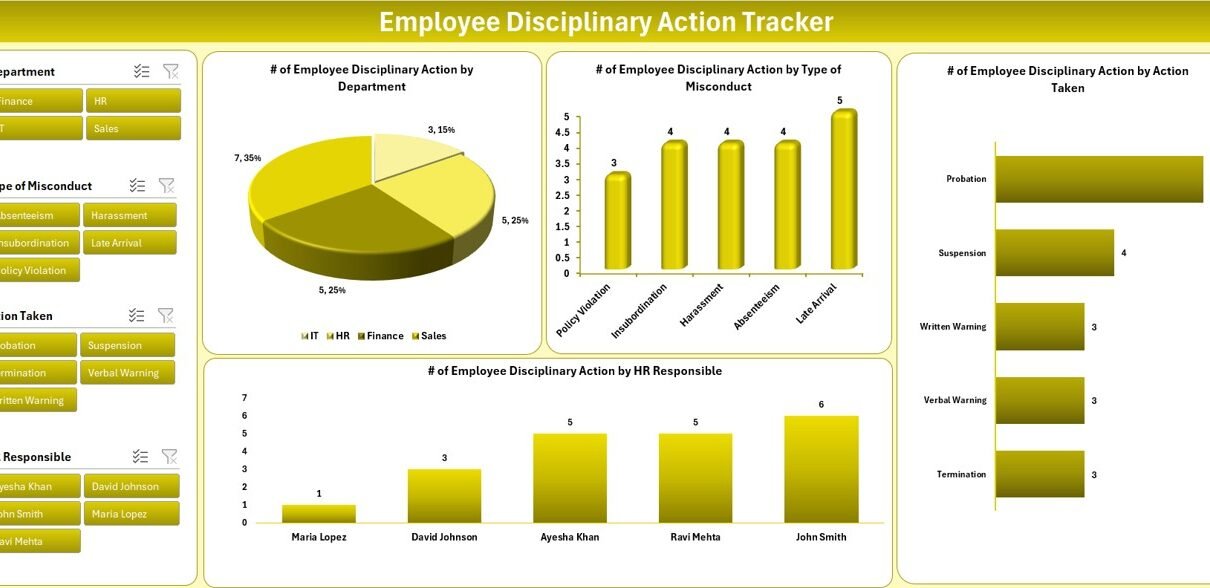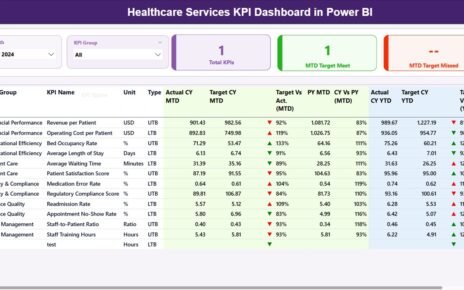Managing employee discipline can often feel overwhelming without a proper system in place. However, the good news is you don’t need expensive software to keep everything in check. With our Employee Disciplinary Action Tracker in Excel, you can now track, manage, and analyze disciplinary cases with ease, all in one place.
This tool is built with Excel and enhanced using VBA, offering a seamless interface and a powerful backend to streamline your HR processes. Whether you’re an HR manager, team lead, or business owner, this tracker helps you maintain records efficiently while ensuring transparency and accountability.
Click to Purchases Employee Disciplinary Action Tracker in Excel
What Is the Employee Disciplinary Action Tracker in Excel?
The Employee Disciplinary Action Tracker is a pre-built Excel and VBA-based tool designed to log and monitor misconduct cases, actions taken, and resolutions. It includes:
-
A Login system for access control
-
A Data Entry Form for simplified record entry
-
A visually dynamic Dashboard with slicers and charts
-
User management and configurable settings
-
Automated data storage and updates
-
Editable dropdowns for misconduct types, departments, etc.
In short, it’s everything you need to manage disciplinary records — without writing a single formula!
Key Components of the Tool
Let’s break down the components that make this tracker intuitive, powerful, and ready-to-use.
Login Form for Controlled Access
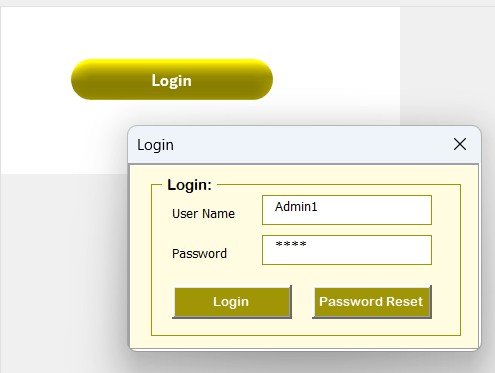
The tool opens with a secure login interface. You can:
-
Use User ID:
Admin1 -
Enter Password:
abcd -
Hit Login to enter the dashboard
This step ensures that unauthorized users cannot view or modify sensitive data. You can also customize usernames and passwords using the User Management panel.
Main Form – Your Control Center
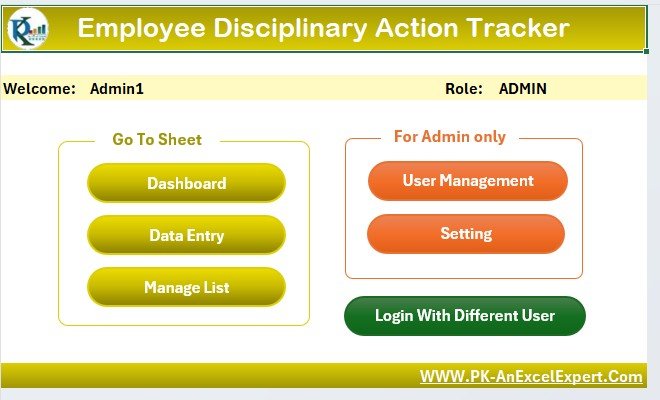
Once you log in, you’ll be taken to the Main Form, the central hub where you manage all data operations. You can:
-
Access data entry options
-
Navigate to reports
-
Launch the dashboard
-
Open user management
-
Update settings
Every action is just a click away, designed for simplicity and efficiency.
Click to Purchases Employee Disciplinary Action Tracker in Excel
Dashboard Sheet – Visual Insights at a Glance
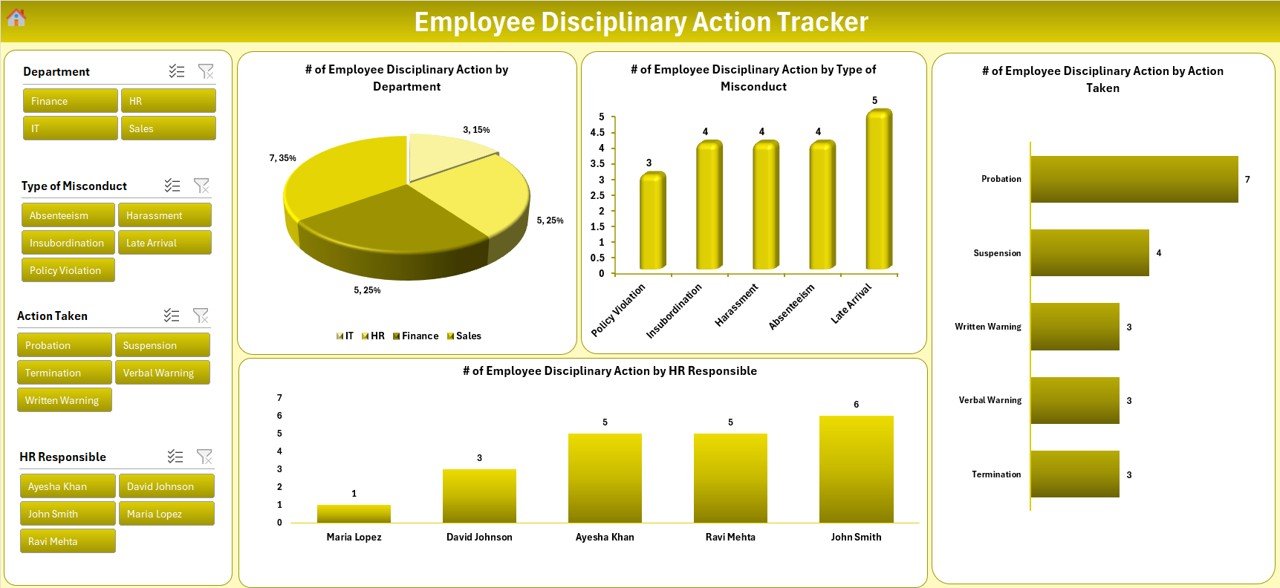
The Dashboard tab displays visual summaries of your data using Excel charts and slicers. Here’s what it includes:
-
4 Interactive Slicers: Filter by date, department, misconduct type, and HR responsible
-
Pie Chart: Employee Disciplinary Actions by Department
-
Column Chart: Actions by Type of Misconduct
-
Bar Chart: Actions Taken
-
Bar Chart: HR Responsible Distribution
This dashboard provides real-time analytics so you can track patterns and address issues proactively.
Data Entry Sheet – Central Record-Keeping
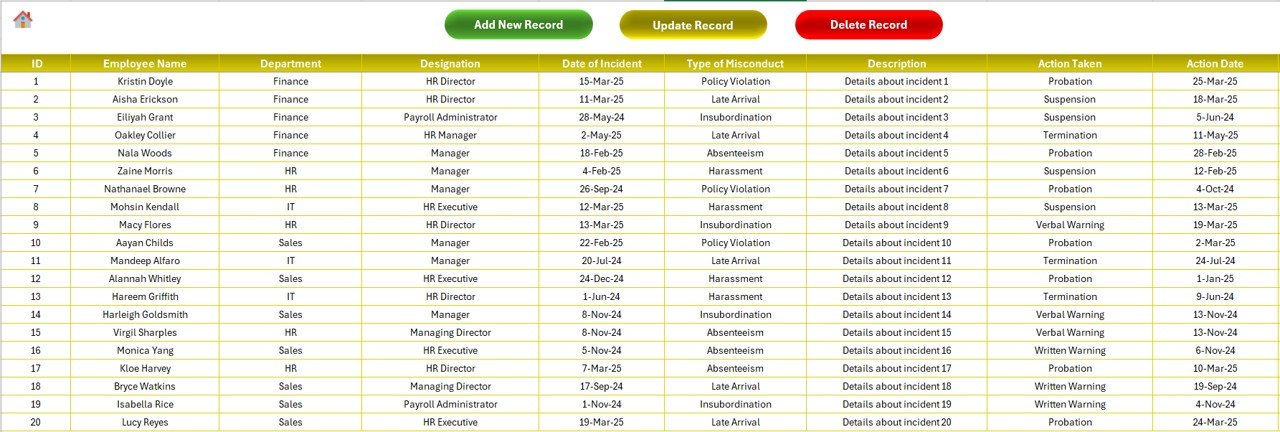
This tab holds the main database with columns like:
-
ID
-
Employee Name
-
Department
-
Designation
-
Date of Incident
-
Type of Misconduct
-
Description
-
Action Taken
-
Action Date
-
HR Responsible
-
Remarks
At the top, you’ll find three essential buttons:
➕ Add New Record
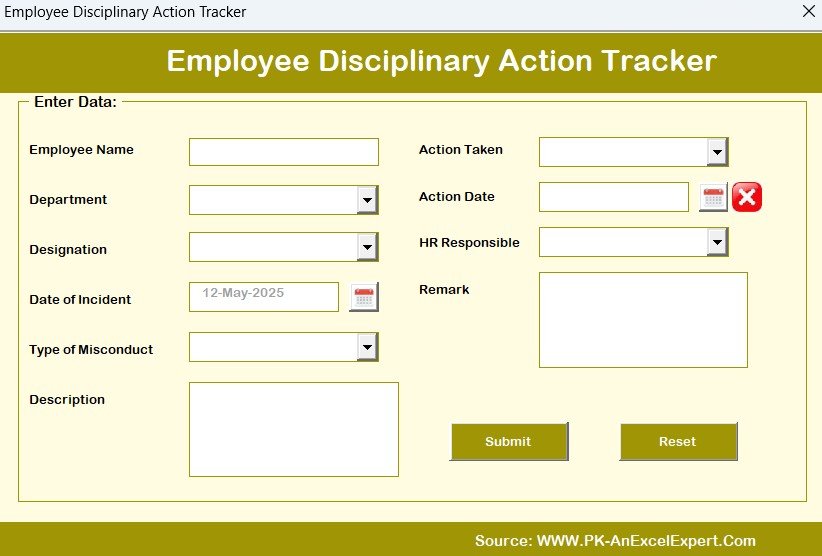
Clicking this opens the data entry form. Fill in the fields and hit Submit. The new record appears instantly, and the dashboard updates automatically.
🖊️ Update Record
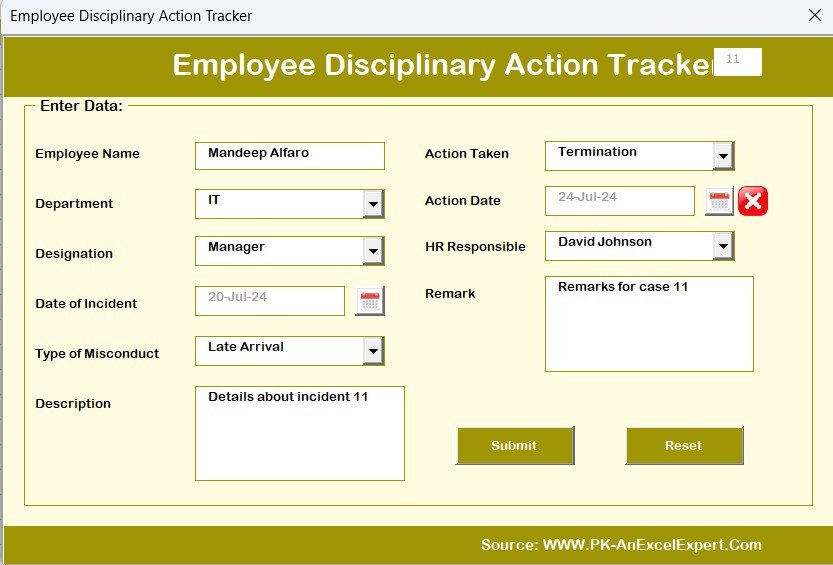
Select an existing ID and click Update Record. The form opens prefilled — simply make edits and resubmit.
❌ Delete Record
Select the record ID and click Delete. A confirmation popup appears to avoid accidental deletions.
Click to Purchases Employee Disciplinary Action Tracker in Excel
Manage List Sheet – Customize Your Dropdowns
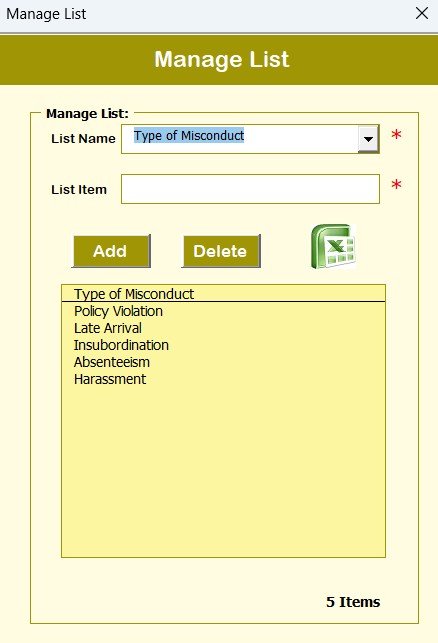
This is where you can manage options for the following fields:
-
Department
-
Designation
-
Type of Misconduct
-
Action Taken
-
HR Responsible
You can add or delete options here. These lists automatically update the drop-downs in the data entry form. It saves time and ensures consistency.
Support Sheet – Power Behind the Dashboard

This hidden sheet includes pivot tables that drive the dashboard charts. You don’t need to touch it unless you want to customize the pivot logic. Just keep it hidden for a clutter-free experience.
User Management – Add or Remove Users
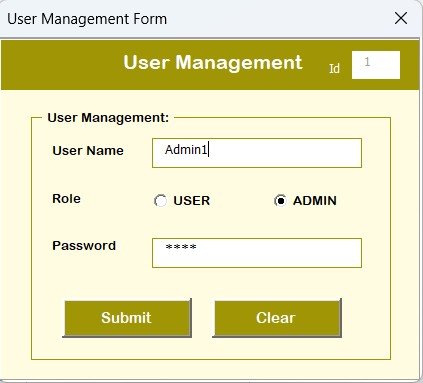
Click the User Management button on the main form to:
-
Add new users
-
Update existing user information
-
Delete users no longer in the system
-
Change passwords
This allows multiple HR users to manage the tool independently while maintaining data integrity.
Settings Sheet – Optional Configuration Panel
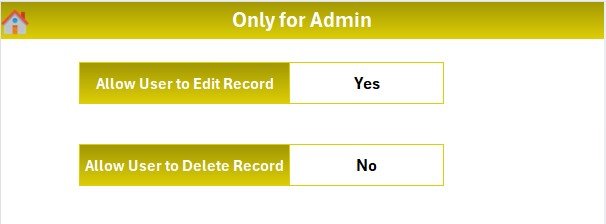
Although not heavily used, the Settings sheet allows you to manage tool-specific configurations. You can set default values, form preferences, or naming conventions from here.
Advantages of Employee Disciplinary Action Tracker in Excel
Still wondering why you should use this tool? Let’s look at the clear benefits:
📌 1. Centralized Records
All misconduct records are in one place, reducing manual paperwork and confusion.
📌 2. Time-Saving Interface
Use forms to add, update, or delete data without scrolling through rows.
📌 3. Real-Time Dashboard
Get instant analytics through charts and slicers — no need to wait for monthly reports.
📌 4. User Access Control
Limit unauthorized access with secure login and user roles.
📌 5. Cost-Effective
Why spend on expensive software when Excel can do the job — beautifully?
Best Practices for Using the Tracker
To get the most out of this tool, follow these best practices:
🔄 Regularly Update the Records
Don’t wait until the end of the month. Log incidents as they happen to maintain accuracy.
🔒 Secure Your Excel File
Use password protection for the workbook to prevent unauthorized file access.
🧼 Keep Drop-Down Lists Clean
Remove outdated departments or HR names from the Manage List tab to ensure form accuracy.
🧪 Test Before Rollout
If you’re sharing this tracker across teams, test the workflow first using dummy data.
🧾 Backup Your Data
Although Excel is stable, it’s wise to back up your file weekly or monthly.
Who Can Use This Tool?
This tracker is ideal for:
-
HR Managers
-
Team Leaders
-
Operations Managers
-
Small Business Owners
-
Admin Departments in Educational Institutions
Basically, any organization that needs to document and act on employee discipline professionally.
Use Cases in the Real World
Here are a few examples of how this tracker adds value:
-
In Manufacturing: Track safety violations by shift or department.
-
In IT Companies: Monitor policy breaches or data misuse cases.
-
In Educational Institutions: Log behavioral issues by faculty or administrative staff.
-
In Customer Service: Record attendance, misconduct, and disciplinary actions by team.
Can I Customize the Tool?
Yes! That’s the beauty of Excel and VBA. You can:
-
Add more fields to the data entry form
-
Modify the dashboard charts
-
Change login credentials and form behavior
-
Add new drop-down list categories
If you’re familiar with Excel VBA, the possibilities are endless.
Conclusion
Managing employee discipline doesn’t have to be messy or time-consuming. The Employee Disciplinary Action Tracker in Excel offers a smart, structured way to track incidents, actions, and resolutions. With easy navigation, a powerful dashboard, and secure access, it provides everything you need in one affordable package.
Instead of relying on memory or scattered emails, you can now handle sensitive employee matters with confidence, clarity, and complete records.
❓ Frequently Asked Questions (FAQs)
Q1: Can I use this tool without knowing VBA?
Yes! The tool is completely ready-to-use. You don’t need to write or understand any VBA code to use it.
Q2: Can I add more users or change passwords?
Absolutely. Go to the User Management panel and update user credentials easily.
Q3: What Excel version do I need to run this tracker?
It works best with Microsoft Excel 2016 or later (including Office 365), especially for macro-enabled features.
Q4: Can I expand the charts in the dashboard?
Yes, you can modify the pivot tables or duplicate existing charts to create additional views.
Q5: Is my data secure in this tool?
The tracker includes login protection and supports Excel-level file password security. However, for enterprise-grade security, consider storing your file on a secure network.
Visit our YouTube channel to learn step-by-step video tutorials
Watch the step-by-step video tutorial:
